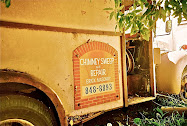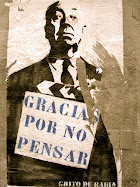





"Estos son mis juicios y por el hecho de estamparlos no concedo a nadie el derecho de enunciarlos como suyos: por lo menos los considero como 'bienes públicos comunes' y daré palmetazo al que los entienda mal" Friedrich Nietzsche




















Carta de los trabajadores de hotel de San Francisco: We are the roomcleaners, cooks, dishwashers, bussers, bellpersons, servers, bartenders and other hotel workers who have always been happy to serve you at more than 60 San Francisco hotels. But now we ask you to boycott seven hotels in our city. | ||
Since August 2009, we have been fighting to get a fair deal with the corporations that run some of San Francisco's biggest hotels. Despite the economic downturn, the hotel industry remains fundamentally profitable, both in San Francisco and nationally. But companies like Hyatt, Starwood, and Hilton want to pretend none of this matters. They are trying to churn even more profits by squeezing workers like us. | ||
We are not going to stand for the corporations' excuses. They don't need to take away affordable family health care to ensure the "health" of their businesses. As a result, over the past few months San Francisco hotels have seen picketlines, civil disobedience, and strikes. | ||||
| Dozens of organizations, big and small, have decided to stay out of this labor dispute and use a different venue. If you have a reservation or an event at the following hotels, you should move to another hotel immediately. Please contact us for information and help. Hilton San Francisco Union Square Grand Hyatt Hyatt Fisherman's Wharf* Le Meridien Hotel* Palace Hotel Westin St. Francis W Hotel | ||||
In addition to the boycotts at these seven hotels, the following San Francisco properties are at risk of a dispute. If you have an upcoming event at one of these hotels, please contact us so we can provide you with advice on how to protect your event from the effects of a boycott or strike if they should occur.
| ||||



just a note to remind you know that monday, may 17th is a holiday. the occasion is malcolm x day. this day is probably only celebrated in berkeley, california, but since that is where we are, we are celebrating him. who was malcolm x? well the best way to find out is to read "the autobiography of malcolm x" as told to alex haley or see the movie "malcolm x" by the director spike lee. both are excellent and i recommend either or both wholeheartedly. for those who don't want to take the time to read the book or see the movie (3 hours) i'm going to try and tell you a little about the guy. i get a little overenthusiastic about this information, so feel free to ignore me. ok here goes: let's see. so. in the united states, the 1960's was a time of great social unrest. the vietnam war was going on and a lot of people were upset about our involvement in the war (sound familiar?) also people were getting more "free" in their behavior. drug use was becoming common and it was the era of "free love". more important, minority races in the united states started fighting for civil rights. there were peaceful demonstrations as well as riots in major cities. two of the most prominent african-american civil rights leaders of that time were dr. martin luther king, jr (for whom we have a national holiday in january) and malcolm x. both were leading the fight against discrimination and segregation, and both wanted african-americans treated with dignity. however, their approaches were totally different. martin luther king believed in a non-violent approach; he thought that violence should not be met with more violence. malcolm x believed that in some cases where people were being treated violently, violent resistance was justified. he made the famous statement that african americans would gain their rights "by any means necessary". to understand malcolm x, we should talk a little about his life. he was born malcolm little in omaha, nebraska. his father was murdered by whites when malcolm was 6 years old. malcolm and his mother moved to detroit. although he showed talent in school, malcolm dropped out at age 15 and moved to new york city. there, he turned to the world of crime. by the age of 21 he was in prison. malcolm spent 6 years in prison where he learned about the black muslim movement and the teachings of tjhe black muslim leader, elijah muhammad. he came to feel that he had been wasting his time in his previous lifestyle and that what was important was to follow a religious life, and work for the benefit of african-americans. at that time, he believed in elijah muhammad's teaching that all white people are "devils" and that african americans should live separately from whites. on his release from prison, malcolm was a devoted follower of elijah muhammad. he took the last name "x" which meant "undknown." by that, he meant to say that african americans no longer knew their original african names, because in america whites had taken away those names and had given african-americans the last names of white families. malcolm became the assistant minister of the black muslims'detroit mosque. elijah muhammad, pleased with malcolm's work, transferred him to philadelphia and later assigned him to a mosque in harlem, which is a major african-american area of new york city. by the end of 1956, the new york mosque was one of the most successful in the black muslim movement. by the early 1960's, malcolm x was better known than elijah muhammad, who was supposed to be his superior. this caused a great deal of jealousy and elijah muhammad started to give less and less responsbility and authority to malcolm x which led to a rift between the two. in 1963, malcolm x stopped serving as minister of the new york mosque. he made two trips to africa and to the middle east. as a muslim, malcolm x went on a "haj" to mecca. in his travels and especially on his trip to mecca he changed his view that there could be no co-operation between races. he saw people of all colors worshipping together and realized that islam was not a religion of separatism and violence, but one of peace. when he got back to the united states, he attempted to organize a group of his own, the "organization of afro-american unity. he traveled all over the united states with a message of african-american dignity and independence and hope that there could be cooperation between black and white people all over the world. his views at this time drew closer to the views held by martin luther king jr. |


































































